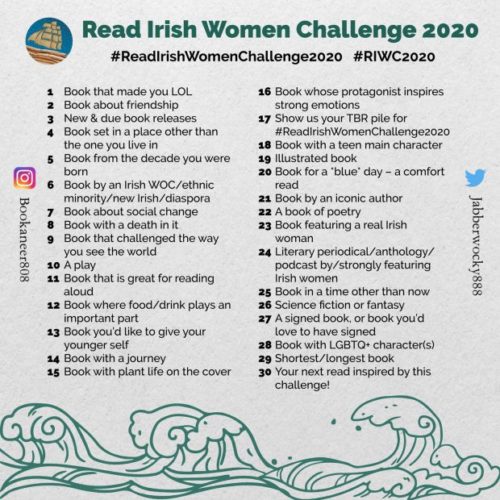
Karina Clifford is a bookseller with Dubray Books. An avid reader, she created the #ReadIrishWomenChallenge in April 2019. Several writers and readers engaged with this challenge on social media, where a prompt would be given each day to name a book written by an Irish woman writer that fits the criteria:
“A book that made you laugh.”
“A book based on mythology.”
“An award-winning book.”
This year, the challenge will consist of a brand-new list of prompts. We spoke to Karina about her inspiration and the future of the initiative.
What inspired you to create the #ReadIrishWomenChallenge last year?
One of my main inspirations was reading Anne Enright’s essay, “Call Me George,” first published in the London Review of Books, now collected in No Authority: Writings From the Laureateship. She wrote piercingly and persuasively about the lack of representation of women in the book reviews in Irish papers. Both books written by women and book reviews by women received far less space than similar pieces by and about men’s writing. I also participated in a March reading challenge by a UK writer in which only UK/US writers were mentioned; Irish writers seemed completely non-existent! So, the two came together in my head – I wanted to put the spotlight on Irish women writers.
Have you discovered any authors or works through this initiative that you wouldn’t have known about otherwise?
Yes! Sheila Pim was a successful crime writer in the 1940s and ‘50s. She incorporated her knowledge of botany, beekeeping, and gardening to add details to her plots – and also to give a fascinating picture of everyday Irish life during that time. I’m also delighted to say that a lot of people told me that they had encountered Irish women YA writers for the first time thanks to the challenge – and they loved them!
How do you decide what prompts to include in the challenge?
A mix of genres I’d like to highlight and areas I’d like to discover more about!
What kind of changes have you made this year and why?
I feel like books have a remarkable ability to spark and foster discussion about the world we live in, which is why one of the prompts this year is “A book about social change.” Irish society has seen a lot of changes so it will be interesting to hear about the writing that reflects this.
What do you see for the future of the #ReadIrishWomenChallenge?
I’d love to see some events tied in with the challenge, such as an evening of people gathering to read out favourite passages written by Irish women authors and discussing them. That would be amazing!




